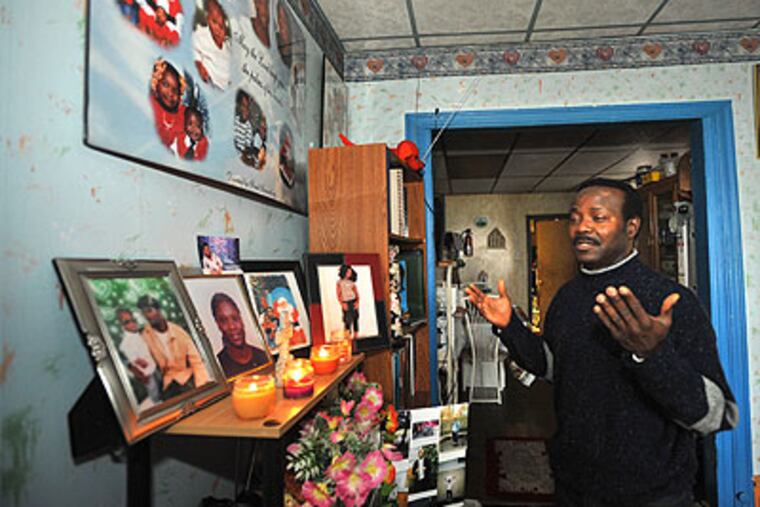A year after deadly blaze, holidays bring heartache
In holiday seasons past, Alfred Teah always decorated his West Philadelphia rowhouse with long chains of colored lights and blinking decorations "from the second story, down to the front yard."

In holiday seasons past, Alfred Teah always decorated his West Philadelphia rowhouse with long chains of colored lights and blinking decorations "from the second story, down to the front yard."
This year, those decorations sit in a box in his basement.
"Eventually, I'll give them away. I'm not going to need them anymore," said Teah, 48, a Liberian immigrant who lost three grown children and a baby grandchild in a day-after-Christmas blaze last year that claimed seven lives in Southwest Philadelphia. The victims, including two other children and an adult man, were all of West African descent.
"Time heals wounds. That's what they say. With me, there have been times when I tried to be happy," Teah said yesterday, his voice quavering. "But I don't think I will ever get healed."
Teah, who drives a shuttle bus for the city at Philadelphia International Airport, said he had been coping, "trying to hold on as much as I could," until a week ago, when he found himself crying all night during a 9 p.m.-to-6 a.m. shift. He spoke to his supervisor, who was understanding, he said, and immediately arranged for him to take some time off.
Last year, eight members of Teah's family gathered at his house for a joyous Christmas meal. This year, in a room filled with pictures of his deceased children and grandchild, Teah created a shrine of candles that has been burning around the clock since the anniversary of their deaths.
On Christmas Eve, he said, he "stood vigil" alone near the shrine all night, listening to soft Christian music.
He asked friends not to call him with best wishes on Christmas Day. He even turned off the ringer on his telephone.
"I know they mean well," he said, "but I don't want to hear 'Merry Christmas' anymore. I'm done with Christmas. To me, to my family, it's a date of sadness. I will never enjoy Christmas as I have before."
The fire started in the basement of the brick twin where Teah's estranged wife, Christiana, lived. Fire officials believe it was caused by a kerosene heater that was improperly filled with gasoline and exploded. Investigators are still looking into why the heater was mishandled.
Killed in the fire were Teah's son Elliott, 23; Elliott Teah's 1-year-old son, Zyhire; Teah's daughters, Vivian, 25, and Jennifer, 17; 8-year-old Ramere Wright-Dosso; 6-year-old Mariam Wright-Dosso; and family friend Henry Gbokoloi, 54.
The tragedy produced an outpouring of sympathy. Fifteen hundred mourners, including immigrant-organization leaders from throughout the Eastern Seaboard as well as Liberia's ambassador to the United States, attended the seven-casket funeral at Divine Mercy Parish in Southwest Philadelphia.
Some mourners wore traditional African dress, including bright hair ties shot through with golden threads and simple robes. Most wore jet-black finery beneath tear-streaked faces.
Addressing the bereaved, Liberian Ambassador Nathaniel Barnes passed along the condolences of Liberian President Ellen Johnson-Sirleaf as well as her personal check for $5,000 to the survivor's fund.
Then, waxing philosophical, he added: "Many times we live our lives as if life is certain and death is uncertain, when in fact it is the other way around. The lesson is: Life is uncertain. So do something good and positive before death finds you. . . . I beg you, do not let the lessons of these young lives go unlearned."
For Liberian immigrant Buster Younis, whose cousin Henry Gbokoloi died in the fire, the deaths led him to make a visit to the Liberian capital of Monrovia to pay a condolence call on Gbokoloi's widow, Linda, and Gbokoloi's eight children.
"It was very tough for them to lose a loved one like that," said Younis. "It still feels like Henry just went somewhere to visit. It doesn't feel like he passed. We are praying to God every day to keep the family strong, to keep everybody healthy."
Younis, 44, of Willingboro, is a shipping and receiving clerk for a New Jersey cosmetics company who used to speak by phone to his cousin several times a day.
Just hours before the fatal fire, Gbokoloi, who called Younis "Cuz," left a message of love and best wishes for him and his family for the holidays.
"Even today, I still have his voice mail on my cell phone," said Younis. "Every 21 days I save it again."